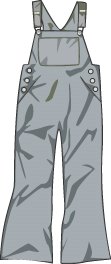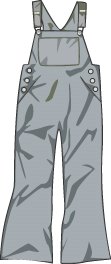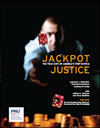 Administrative Judge Roy Pearson, lampooned high and low for his ludicrous $67M lawsuit over a pair of pants he claims were lost by his dry cleaners, lost his case today. And it didn’t even matter that he reduced his demand to only $54M.
Administrative Judge Roy Pearson, lampooned high and low for his ludicrous $67M lawsuit over a pair of pants he claims were lost by his dry cleaners, lost his case today. And it didn’t even matter that he reduced his demand to only $54M.
He didn’t just lose his ridiculous claims for millions of dollars for claims that included emotional distress, he also lost the small claims part of his case for the actual pants themselves.
And he may get socked for sanctions and attorneys fees for engaging in “in bad faith and vexatious litigation.” That seems like an understatement. You can read the decision here: PantsPearsonDecision.pdf
Judge Judith Bartnoff noted at the end of the decision, that:
The issue of the defendants’ claim for attorney’s fees against the plaintiff will be addressed after the defendant’s motions for sanctions and for attorney’s fees have been filed and briefed by the parties.
Pants Pearson can’t be happy today.
Regarding the actual pants, Judge Bartnoff noted that Pearson had not met his burden of proof:
With regard to the alleged missing pants, the plaintiff has not met his burden of proving that the pants the defendants attempted to return to him were not the pants he brought in for alterations. At best, the evidence on that subject is in equipoise. The Court agrees with the plaintiff that the pants in the defendants’ possession do not appear to match the jacket to his burgundy and blue pinstriped suit. The Court also will accept that Mr. Pearson does not like cuffs on his pants. The plaintiff may well believe that he brought the pants to his burgundy and blue pinstriped suit to the defendants, but there also is strong evidence that he did not.
The Court found Soo Chung to be very credible, and her explanation that she recognized the disputed pants as belonging to Mr. Pearson because of the unusual belt inserts was much more credible than his speculation that she took a pair of unclaimed pants from the back of the store and altered them to match his measurements. Mr. Pearson only recently had received four suits back from his son, he brought in several pairs of pants over a period of less than two weeks for alterations, and it certainly is plausible that the pants on the hanger with his blue and burgundy pinstriped suit jacket were not the pants that matched the jacket, even if Mr. Pearson assumed that they were. The Court need not determine what did happen; what it must do is to determine if Mr. Pearson proved that the defendants intentionally misled him and otherwise are liable to him under the CPPA based on the pants. The Court finds that he has not made that proof.
In making its findings, Judge Bartnoff also noted about his prior divorce litigation, that:
[T]he litigation was disproportionately long, despite the relative simplicity of the case, and that Mr. Pearson “in good part is responsible for excessive driving up of everything that went on here” and created “unnecessary litigation.” Mr. Pearson therefore was ordered to pay $12,000 of his wife’s attorney’s fees.
That doesn’t bode well for him for the coming hearing on sanctions and attorneys fees.
What’s the lesson in all of this?
1. We are a nation of 300 million. There are a few nuts out there.
2. Pearson is an administrative law judge. Those who want to strip the right of trial by jury from the citizenry should note that sometimes people get elected or appointed judge and they may not be the type of person you want sitting in judgment. A community, known as a jury, works a whole lot better than being at the mercy of an individual.
Addendum: The American Association for Justice, the nations largest group of pro-consumer trial attorneys (of which I am a member), issued this statement:
“A multi-million dollar lawsuit over a pair of pants was both ridiculous and offensive to our values. Our civil justice system must be reserved for those who seek fair compensation when they are the victim of true wrongdoing or negligence. The court has ruled wisely in this matter. Opponents of our civil justice system should pay heed to this decision — it clearly shows that the system works to deny outrageous and ridiculous claims.”
AAJ has been sharply critical of Judge Pearson’s lawsuit seeking $54 million in damages over a lost pair of pants. In April, AAJ CEO Jon Haber called on the District of Columbia Bar Association to conduct a disciplinary investigation of Judge Pearson for his conduct in this matter. Haber and AAJ President Lewis “Mike” Eidson pledged to support the defendant’s defense fund and encouraged the AAJ membership to also contribute (www.customcleanersdefensefund.com).
News links to Pants Pearson decision:
- Plaintiff Gets Nothing in $54M Case of Missing Pants (Washington Post)
- Dry cleaner wins missing pants case (Associated Press)
- Judge Rules in Favor of Dry Cleaners in $54M Pants Lawsuit (ABC News)
Blog Links:
- Justice Prevails (Obsidian Wings)
- Justice Served in Pants Case (Rhymes with Right)
- Should Judge Pearson Lose His Gavel? (WSJ Law Blog – Peter Lattman)
- The Implications of the $54 Million Missing Pants Verdict (Professor Bainbridge)
- Pantsed! (CounterfeitChic)
(Eric Turkewitz is a personal injury attorney in New York, who understands that when one lawyer does something incredibly stupid, it tarnishes the entire profession in the eyes of some.)



